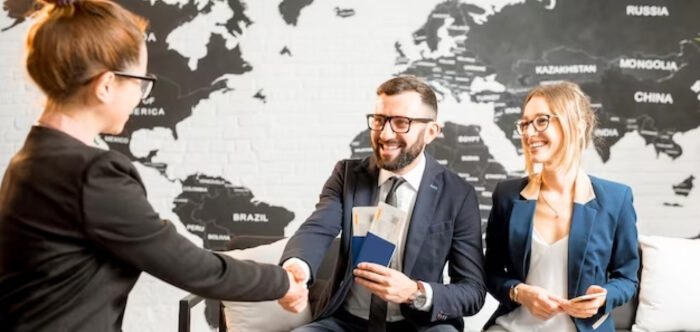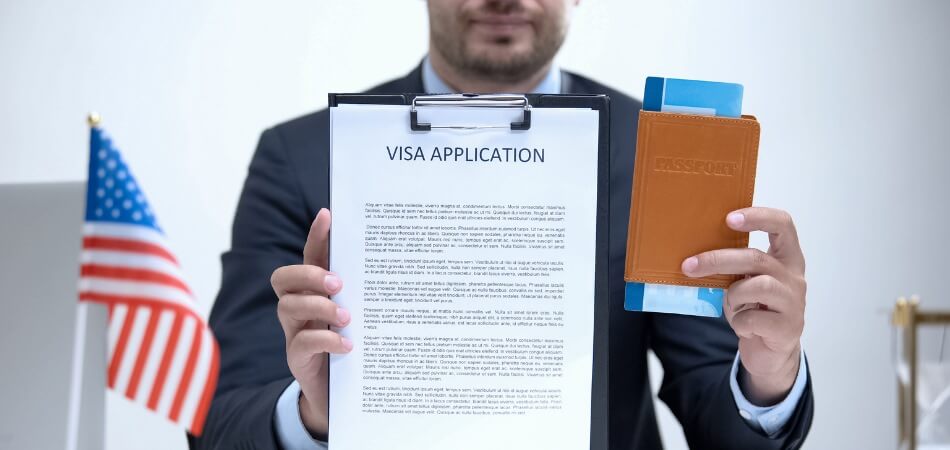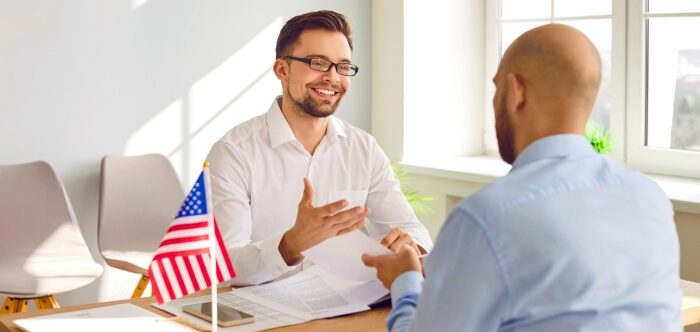Ever dreamed of going to a conference in the United States? It could be about your job, studies, or just something you’re passionate about. But before you start planning your trip, one crucial question that often comes to mind is, can I get a US visa for a conference?
Yes, you can apply for a US visa to attend a conference in the United States. The type of visa you would typically apply for in this situation is a B-1 Business Visitor Visa, which includes attending conferences, seminars, and meetings as one of its permissible activities.
In this guide, we’ll show you the steps, papers, and things to think about to boost your chances of getting a visa. Whether you’re a business person, a student with research to share, or just curious, come along as we reveal how to get a US visa for your next conference.
What Is the Purpose of A Conference Visa?
A conference visa serves a vital role in developing international connections and sharing knowledge. It’s specifically designed for people from other countries who want to attend conferences, seminars, meetings, or conventions in the United States.
Attending international events in the USA brings together experts, business professionals, researchers, and enthusiasts eager to exchange ideas and stay updated in their fields. Whether you’re a scholar looking to share research findings or a businessperson seeking new opportunities, this visa category makes it easier for you to participate in these events.
Many conference participants wish to stay in the US after the event. They change conference visa to work permit through laws and regulations as per the US government. Therefore, it attracts many to participate a conference in the USA with a validating conference visa at the first point.
A conference visa helps promote global collaboration and knowledge-sharing by allowing people from around the world to come together in the U.S. It supports international relations and contributes to the growth of various industries by enabling individuals to engage in discussions, share their insights, and stay at the forefront of developments in their fields. So, if you’re thinking of attending a conference in the U.S., this visa is your ticket to an enriching experience.
Can I Get a US Visa for A Conference?
Attending a conference in the United States can be an enriching experience, but you may wonder, “Can I get a US visa for a conference?” Yes, and here’s a step-by-step guide to help you navigate the process.
Step 1: Determine the Right Visa Type
To attend a conference in the U.S., the B-1 Business Visitor Visa is generally the appropriate choice. It covers activities like attending conferences, seminars, and meetings, making it ideal for conference participants.
Step 2: Gather Required Documents
Collect essential documents, including a valid passport, a completed DS-160 form (the online nonimmigrant visa application), a visa application fee receipt, and an invitation letter from the conference organizers. This invitation letter should outline the event’s details and the purpose of your visit.
Step 3: Pay the Visa Fee
Pay the non-refundable visa application fee, which varies depending on your nationality and the visa type. You can find the fee information on the U.S. embassy or consulate website. Ensure that you keep the receipt as proof of payment.
Step 4: Schedule a Visa Interview
Visit the U.S. embassy or consulate’s website to schedule an interview. Be prepared to discuss the purpose of your trip and provide supporting documents during the interview. Interview wait times and procedures can vary, so check with the specific embassy or consulate for details.
Step 5: Attend the Visa Interview
On the interview day, bring all required documents and be ready to answer questions about your travel plans, your ties to your home country, and the conference you plan to attend. If approved, you will receive instructions on collecting your visa.
Step 6: Plan Your Travel
Once you have the visa, plan your travel to the U.S., ensuring you have all necessary documents for entry, including your passport, visa, and invitation letter from the conference organizers. Make travel arrangements and accommodations as needed.
Securing a U.S. visa for a conference is a manageable process if you follow these steps diligently. With the right preparations and documentation, you’ll be on your way to attending that conference and expanding your horizons in the United States.
Eligibility Criteria for Obtaining a Conference Visa in the US
Eligibility criteria for obtaining a conference visa in the United States vary depending on the specific visa category you’re applying for. Once you understand the criteria of a conference visa you can apply to join upcoming conferences in USA 2024 with invitation letter from well-known organizers and institutes. However, for most individuals seeking to attend a conference on a B-1 Business Visitor Visa, the following general eligibility criteria apply.
Purpose of Visit
You must demonstrate that your primary purpose for traveling to the United States is to attend a conference, seminar, or similar business-related event. Your intention should align with the permissible activities under the B-1 visa category.
Ties to Your Home Country
To prove your intent to return to your home country after the conference, you should provide evidence of strong ties, such as stable employment, property ownership, family connections, or other commitments. This helps establish your non-immigrant intent.
Sufficient Financial Means
You should have the financial means to cover your travel expenses, including conference registration fees, accommodation, transportation, and daily expenses, without the need to work in the United States during your stay.
Compliance with U.S. Laws
You must have a clean immigration record, with no past violations of U.S. immigration laws. Additionally, you should be committed to following your visa’s terms, including maintaining your non-immigrant status by leaving the U.S. on time and refraining from unauthorized work or activities. Adhering to these rules is essential for a smooth visit and future visa eligibility.
Invitation Letter
The conference organizers should send you an invitation letter. This letter should mention why your presence at the conference is important and what your role will be, like attending or presenting. Having a good invitation letter can make a big difference in your visa application. Make sure to include it with your application.
Documentary Evidence
You may need to provide documentary evidence supporting your visa application, such as your passport, a completed DS-160 form, visa application fee receipt, and any additional documents requested by the U.S. embassy or consulate.
No Criminal Record
If you have a criminal record or have violated U.S. laws or visa rules before, it may affect your eligibility for a conference visa. Seek guidance from the U.S. embassy or consulate if you have concerns.
Health Requirements
While standard travel doesn’t require specific vaccinations, keep an eye out for any health advisories related to diseases. Make sure to follow any health guidelines or requirements set by U.S. authorities.
Different Visa Types for Us Travel
When planning to attend a conference in the US, you should know the types of conference visas available to choose the one that suits your specific needs. Here’s an overview of the different types of visas available for foreigners.
B-1 Business Visitor Visa
The B-1 Business Visitor Visa is ideal for those traveling to the U.S. for business-related purposes. This visa allows entry for activities like attending conferences, seminars, or meetings, as well as negotiating contracts or participating in training programs.
B-2 Tourist Visa
The B-2 Tourist Visa is designed for individuals visiting the United States for tourism, pleasure, or casual visits to friends and family. It covers activities such as sightseeing, tourism, or seeking medical treatment.
F-1 Student Visa
The F-1 Student Visa is for international students pursuing full-time academic programs at accredited U.S. institutions. It enables students to study in the U.S. while also allowing for certain employment opportunities on campus and during Optional Practical Training (OPT).
J-1 Exchange Visitor Visa
The J-1 Exchange Visitor Visa promotes cultural and educational exchange programs. It covers a wide range of activities, including research, teaching, studying, and participating in internships, au pair programs, and more.
H-1B Specialty Occupation Visa
The H-1B Visa is for foreign professionals with specialized skills or knowledge. It is typically sponsored by U.S. employers and allows individuals to work temporarily in positions that require specific expertise.
L-1 Intracompany Transferee Visa
The L-1 Intracompany Transferee Visa is particularly advantageous for employees of multinational companies. It facilitates the temporary relocation of employees within the same company to the United States, allowing them to work in a U.S. office.
Selecting the right type of visa based on your travel purpose and eligibility criteria requires understanding these visa types. Careful consideration will help ensure a smooth and successful journey to the United States.
Managing Challenges While Getting a US Visa for a Conference
While securing a US visa for a conference is often straightforward, it’s essential to be prepared for potential challenges along the way. They can significantly change the chances of a visa acceptance. Here are some valuable insights to help you navigate the process with confidence. When you are confident in your preparation, it’s time to get US visa for conference and have the chance of settling for good.
- Document Preparation: Ensure all required documents, including the invitation letter, are complete and accurate.
- Financial Proof: Be ready to show your financial ability to cover expenses during your stay.
- Interview Preparation: Prepare thoroughly for the visa interview, including answers to questions about your trip’s purpose.
- Ties to Home Country: Emphasize strong ties to your home country to demonstrate your intent to return.
- Application Timing: Apply early to allow ample time for processing and unforeseen delays.
- Travel History: Highlight a history of responsible travel and adherence to previous visa terms.
- Consistency: Ensure consistency between your application, supporting documents, and interview responses.
- Legal Issues: Resolve any previous visa violations or legal issues before reapplying.
- Health Checks: Comply with any required medical examinations and vaccinations.
- Consult Experts: Seek advice from immigration experts or legal professionals for complex cases or concerns.
FAQs
Here are some related inquiries about whether one can get a US visa for a conference or not. We have provided the most suitable answers to them.
What Type of Visa Do I Need to Attend a Conference in the US?
Ans. You will need a B-1 Business Visitor visa to attend a conference in the US. This visa is suitable for business-related activities like meetings, conferences, and other professional events.
How Do I Apply for a B-1 Visa to Attend a Conference in the US?
Ans. To apply, fill out the DS-160 form online, pay the visa application fee, and schedule an appointment at the nearest US Embassy or Consulate. You will need to attend an interview and provide documents like your invitation letter to the conference, proof of ties to your home country, and financial evidence showing you can cover your expenses.
What Documents Do I Need to Provide for the B-1 Visa Interview?
Ans. Key documents include your valid passport, DS-160 confirmation page, visa appointment confirmation, visa fee payment receipt, conference invitation letter, and evidence of ties to your home country, like employment verification or property ownership.
Do I Need a Sponsor to Get a B-1 Visa for a Conference?
Ans. You do not need a sponsor, but having an invitation letter from the conference organizers can significantly support your application by demonstrating the purpose of your visit.
What Should I Do if My B-1 Visa Application Is Denied?
Ans. If your application is denied, you will be informed of the reasons, which are usually related to insufficient ties to your home country or incomplete documentation. You can reapply after addressing the issues cited in the denial.
Bottom Line
Your dream of attending a conference in the United States is entirely achievable. The answer to the question is, can I get a US visa for a conference? is a resounding yes. The B-1 Business visitor visa provides a clear path for participation, whether you’re a business professional, a student eager to share research, or just curious.
A conference visa plays a vital role in fostering international connections and knowledge-sharing, contributing to global collaboration and growth across a wide range of fields. By following the step-by-step guide, you can confidently guide the visa application process.
While challenges may surface, proactive document preparation, financial readiness, and interview preparation can significantly enhance your chances of success. So, when the opportunity beckons, seize it, apply for your conference visa, and essay on your enriching journey to the United States.








